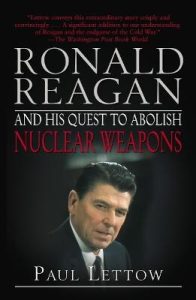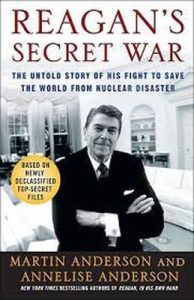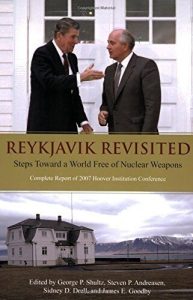
Time has a way of altering our views of the historical record. History is not static. The combination of distance and new evidence can lead to dramatic shifts in the reputations of our former leaders. The 2001 release of previously sealed transcripts and notes from President Reagan’s and General Secretary Mikhail Gorbachev’s historic 1986 Reykjavik summit have led to a new understanding of Reagan’s views on nuclear weapons. As a PhD candidate, Paul Lettow, first mined these notes and combined them with research into Reagan’s personal history to ultimately reveal a man who was morally repulsed by the threat nuclear weapons posed to humanity. Lettow turned his well documented thesis into a 2005 book, Ronald Reagan and His Quest to Abolish Nuclear Weapons. Lettow’s book is the best place to start to learn more about Reagan’s passionate vision for a world free of nuclear weapons.
In 2009, Martin and Annelise Anderson, former aides to Reagan and prolific Reagan historians followed up with an insider’s view in Reagan’s Secret War: The Untold Story of his Fight to Save the World from Nuclear Disaster.
Ronald Reagan And His Quest to Abolish Nuclear Weapons
Author: Paul Lettow
Publisher: Random House
Summary

In Ronald Reagan and His Quest to Abolish Nuclear Weapons, Paul Lettow explores the depth and sophistication of President Ronald Reagan’s commitment to ridding humankind permanently of the threat of nuclear war. Lettow’s narrative spans the start of Reagan’s presidency and the 1986 Reykjavík summit between Reagan and Soviet leader Mikhail Gorbachev, during which America’s Strategic Defense Initiative (SDI) was a defining issue. Lettow reveals SDI for what it was: a full-on assault against nuclear weapons waged as much through policy as through ideology. While cabinet members and advisers played significant roles in guiding American defense policy, it was Reagan himself who presided over every element, large and small, of this paradigm shift in U.S. diplomacy.
Lettow conducted interviews with several former Reagan administration officials, and he draws upon the vast body of declassified security documents from the Reagan presidency; much of what he quotes from these documents appears publicly here for the first time. The result is the first major work to apply such evidence to the study of SDI and superpower diplomacy. This is a survey that doesn’t merely add nuance to the existing record, but revises our very understanding of the Reagan presidency.
Praise
“Lettow conveys this extraordinary story crisply and convincingly. . . . A significant addition to our understanding of Reagan and the endgame of the Cold War.”
The Washington Post Book World
“Paul Lettow’s sharp and succinct book makes the best case yet for why Ronald Reagan deserves to be remembered as one of the most visionary grand strategists of the twentieth century.”
John Lewis Gaddis
“Paul Lettow is lucid and dispassionate. His willingness to go far back, to the very birth of the nuclear age (which coincided with the very birth of Reagan’s anticommunism), and then to trace the story forward as Reagan’s ideology slowly matured, pays triumphant dividends.”
Edmund Morris
Book Review
‘Ronald Reagan and His Quest to Abolish Nuclear Weapons’: In a Galaxy Far, Far Away
About the Author
Paul Lettow is an adjunct senior fellow at the Council on Foreign Relations. The Council on Foreign Relations is an independent, nonpartisan membership organization, think tank, and publisher.
Reagan’s Secret War: The Untold Story of his Fight to Save the World from Nuclear Disaster
Author: Martin and Annelise Anderson
Publisher: Crown Publishers
Summary

On February 6, 1981, at his first National Security Council meeting, Ronald Reagan told his advisers: “I will make the decisions.” As Reagan’s Secret War reveals, these words provide the touchstone for understanding the extraordinary accomplishments of the Reagan administration, including the decisive events that led to the end of the Cold War.
In penning this book, New York Times bestselling authors Martin Anderson and Annelise Anderson drew upon their unprecedented access to more than eight million highly classified documents housed within the Ronald Reagan Presidential Library in Simi Valley, California—unseen by the public until now. Using his top secret clearances, Martin Anderson was able to access Ronald Reagan’s most privileged exchanges with subordinates and world leaders as well as the tactical record of how Reagan fought to win the Cold War and control nuclear weapons.
The most revelatory of these documents are the minutes of Reagan-chaired National Security Council meetings, the dozens of secret letters sent by Reagan to world leaders, and the eyewitness notes from Reagan-Gorbachev summits. Along with these findings, the authors use Reagan’s speeches, radio addresses, personal diaries, and other correspondence to develop a striking picture of a man whose incisive intelligence, uncanny instincts, and quiet self-confidence changed the course of history.
What emerges from this treasure trove of material is irrefutable evidence that Reagan intended from his first days in office to bring down the Soviet Union, that he considered eliminating nuclear weapons his paramount objective, and that he—not his subordinates—was the principal architect of the policies that ultimately brought the Soviets to the nuclear-arms negotiating table. The authors also affirm that many of Reagan’s ideas, including his controversial “Star Wars” missile-defense initiative, proved essential in dissolving the Soviet Union and keeping America safe.
Riveting and eye-opening, Reagan’s Secret War provides a front-row seat to history, a journey into the political mind of a remarkable leader, and proof that one man can, through the force of his deep convictions, bring about sweeping global change.
Praise
“Reagan’s Secret War may change forever the image held by many. . . . With unprecedented access to his private papers, including his personal diary, the Andersons present a deeply involved and adroit leader.”
Henry A. Kissinger
“Artfully and accurately explains how, when, and where . . . All who are interested in the elimination of nuclear weapons should read Reagan’s Secret War.”
James A. Baker III, 61st U.S. Secretary of State
“Ronald Reagan’ s steadfast commitment to abolish all nuclear weapons is brought to life in Martin and Annelise Anderson’s captivating narrative. . . . If the world makes it to the nuclear-free mountaintop, we will have President Reagan to thank for inspiring our climb.”
Sam Nunn, former Senator, Co-Chairman, Nuclear Threat Initiative
Book Review
About the Authors
Martin and Annelise Anderson are coauthors of the New York Times bestsellers Reagan, In His Own Hand; Reagan: A Life in Letters; and Reagan’s Path to Victory. Both are Fellows at the Hoover Institution.
Biography
Reykjavik Revisited: Steps Toward a World Free of Nuclear Weapons
Author: George P. Shultz, Steven P. Andreasen, Sidney D. Drell, and James E. Goodby
Publisher: Hoover Institution Press
Summary

Drawn from presentations made at the Hoover Institution’s October 2007 conference, this collection of essays examines the practical steps necessary to address the current security challenges of nuclear weapons and to move toward the goal Ronald Reagan and Mikhail Gorbachev envisaged in their historic meeting at Reykjavik: the elimination of all nuclear weapons.
The distinguished group of contributors includes former officials of the past six administrations—Republican and Democratic—along with senior scholars and scientific experts on nuclear issues. They discuss the critical issues involved in reducing the number of weapons, preventing the growth of new nuclear weapons capabilities, securing nuclear stockpiles worldwide, the challenges of verification and compliance with treaties to prevent nuclear weapons proliferation, preventing the spread of technology for nuclear fuel enrichment and reprocessing, dealing with regional animosities, and engaging the entire international community in the joint enterprise of reducing the nuclear threat.
Praise
The contributors of Reykjavik Revisited are experienced arms control, nonproliferation, and intelligence professionals, and as the foregoing suggests, they do not sugarcoat the issues or minimize the obstacles. Many of those, seen from today’s perspective, seem insurmountable… Yet, a common thread running through the book is that unconditional adoption of the ultimate goal and then pursuit of each individual step as a component of that larger endeavor will dramatically change the dynamic.
John Holum
About the Editor
In a long and distinguished in government service, George Shultz served as Secretary of State under President Reagan and was at Reagan’s side during the historic Reykjavik Summit.
Biography
